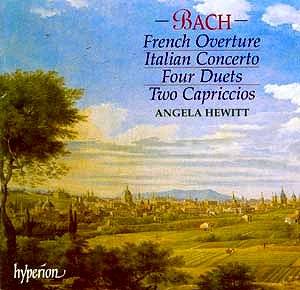   |
Johann Sebastian BACH (1685-1750)
Italian Concerto in F major BWV971 [12.47] 1.[ ] [3.41] 2.Andante [5.38] 3.Presto [3.25] Capriccio on the Departure of his Beloved Brother, in B flat major BWV992 [10.10] 4.Arioso [1.58] 5.Andante (fugato) [1.09] 6.Adagissimo [3.17] 7.Aria Introduction [0.28] 8.Aria di postiglione: Adagio poco [1.04] 9.Fuga all.imitazione della cornetta di postiglione [2.11] 10.Capriccio in E major BWV993 [5.13] Four Duets [10.43] 11.Duet in E minor, BWV802 [2.45] 12.Duet in F major, BWV803 [2.32] 13.Duet in G major, BWV804 [3.24] 14.Duet in A minor, BWV805 [2.01] French Overture in B minor BWV831 [30.00] 15.Overture [12.09] 16.Courante [2.27] 17.Gavotte I [1.23] 18.Gavotte II [1.25] 19.Gavotte I (da capo) [0.46] 20.Passepied I [1.09] 21.Passepied II [0.56] 22.Passepied I (da capo) [0.43] 23.Sarabande [4.00] 24.Bourrée I [0.52] 25.Bourrée II [1.03] 26.Bourrée I (da capo) [0.29] 27.Gigue [2.32] 28.Echo [2.25] Rec: October 2000, Henry Wood Hall, London. Crotchet AmazonUK AmazonUS Amazon recommendations |
Angela Hewitt, who is recording all of Bach's keyboard works on piano, has proven to be one of the most inspired interpreters of his music. This set features the Italian Concerto, the French Overture, as well as the Four Duets and two Capriccios.
This disc starts off with the delightfully beautiful and happy Italian Concerto, a three-movement work, which, together with the French Overture, makes up part 2 of Bach's Clavier-Übung, the second of his published keyboard works. Johann Adolph Scheibe called this "a perfect model of a well-designed solo concerto." It indeed is the perfect transformation of an Italian concerto for orchestra to the keyboard. From the brief, sprightly first movement, to the slow (andante), melodic and moving second movement, through the final fast movement, which recalls the first movement in its verve and energy, this is one of Bach's most lively works for keyboard. Unlike his suites, this short, three-movement work is more concise in its melodic development. Hewitt plays this with great joy and energy; it is not hard to hear how much she enjoys playing this piece.
The other "big" piece on this disc, the French Overture, is the opposite of the Italian Concerto. A long multi-movement work in the French style (with a total of 11 movements), this is perhaps Bach's most ambitious suite. Sometimes called the "seventh partita", because it is in the same form, this is one of his longest keyboard suites (Hewitt plays it at exactly 30 minutes; among her recordings, only the 4th and 6th partitas are longer, at over 32 minutes).
Opening with a dazzling overture - a movement he uses in only three other works - this work is the epitome of the French style of melodically related movements grouped together in a suite. Hewitt shines here, playing each movement with appropriate energy and tempo. Her phrasing, as in most of her Bach recordings, sounds excellent, and her rhythm is well-adapted to the variety of dance movements in the suite. There is delightful accent and syncopation in the bourrees, and her ornamentation here is spot on. Her playing in the gigue flows like a bubbling brook. The closing movement, the Echo, is played with great exuberance, being the perfect tone to end this excellent disc.
The other pieces on this disc are also excellent - the two capriccios and the four duets are all minor works, but are beautiful, like most of Bach's keyboard music.
All in all, this may be the most satisfying disc in Hewitt's series of Bach recordings. The variety of works on this disc, from the Italian Concerto, through the two capriccios, the four duets to the French Overture, give a fine introduction to the wide range of idioms Bach used in his compositions.
Kirk McElhearn